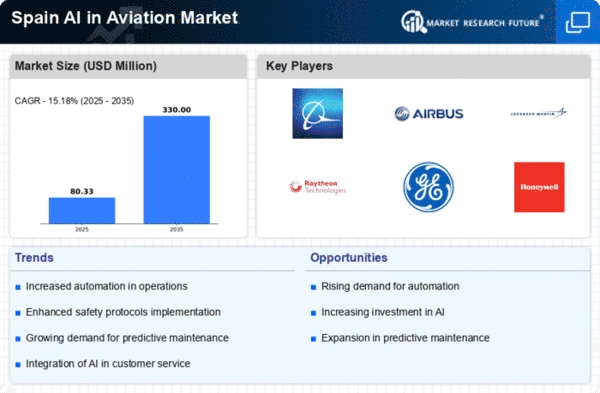Technological Advancements in AI
The rapid evolution of artificial intelligence technologies is a primary driver for the ai in-aviation market in Spain. Innovations in machine learning, natural language processing, and computer vision are enabling airlines to enhance operational capabilities. For instance, AI-driven predictive maintenance systems can reduce aircraft downtime by up to 30%, thereby improving fleet utilization. Furthermore, the integration of AI in air traffic management systems is expected to optimize flight paths, potentially reducing fuel consumption by 10%. As these technologies continue to mature, they are likely to create new opportunities for efficiency and cost savings within the industry.
Regulatory Support and Frameworks
The Spanish government is actively promoting the adoption of AI technologies within the aviation sector through supportive regulations and frameworks. Initiatives aimed at fostering innovation, such as funding for research and development, are becoming increasingly prevalent. The European Union's Green Deal, which emphasizes sustainable aviation practices, is also influencing local policies. This regulatory environment encourages investment in AI solutions that enhance safety and efficiency. As a result, the ai in-aviation market is likely to experience accelerated growth, with an estimated increase in AI-related investments reaching €1 billion by 2027.
Focus on Cost Reduction Strategies
Cost management remains a critical focus for airlines operating in Spain, driving the adoption of AI technologies that can streamline operations. The ai in-aviation market is responding to this need by offering solutions that optimize fuel consumption, reduce maintenance costs, and enhance crew scheduling. For instance, AI algorithms can analyze historical data to predict maintenance needs, potentially lowering operational costs by 25%. As airlines continue to prioritize cost reduction, the integration of AI into various operational aspects is expected to become increasingly prevalent, shaping the future of the industry.
Increased Competition Among Airlines
The competitive landscape of the aviation industry in Spain is intensifying, prompting airlines to seek innovative solutions to differentiate themselves. The ai in-aviation market is benefiting from this competition, as airlines invest in AI technologies to enhance customer service and operational efficiency. For example, AI chatbots are being deployed to handle customer inquiries, improving response times and customer satisfaction. This shift towards AI-driven solutions is expected to lead to a 20% increase in customer engagement metrics. As airlines strive to gain a competitive edge, the demand for AI applications is likely to grow significantly.
Growing Demand for Safety and Security
Safety and security concerns are paramount in the aviation industry, driving the adoption of AI technologies. In Spain, the ai in-aviation market is witnessing a surge in demand for AI-based security systems that can analyze vast amounts of data in real-time. These systems can identify potential threats more effectively than traditional methods, thereby enhancing passenger safety. The market for AI-driven security solutions is projected to grow by 15% annually, reflecting the industry's commitment to maintaining high safety standards. This trend underscores the importance of integrating advanced technologies to address evolving security challenges.
















